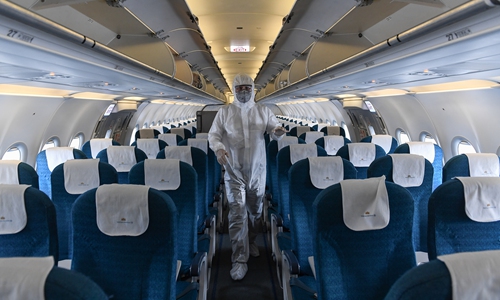Prolonged incubation periods in COVID-19 patients neither identified nor reported: expert

Photo: AFP
The longer-than-reported incubation period has not been identified or reported in the epicenter Wuhan or other places, and the median incubation period is about five to seven days, with longer period of 14 days, said an expert from the Chinese national expert team tasked at combating coronavirus on the ground, during a press conference Wednesday.
Some patients have tested positive after they were discharged from the hospital or after multiple negative tests, and such cases exist in Wuhan, including its province Hubei, Du Bin, director of Medical ICU of Peking Union Medical College Hospital, told during a 5G-powered online press conference. He is currently in the COVID-19 epicenter Wuhan, battling against the outbreak.
"Currently, we have no idea about the exact numbers [of such cases]. No evidence has been found that suggests such patients can transmit the virus to other people, Du said, as commenting on recovered patients again being tested positive.
He also mentioned there is no data showing that a longer incubation exists, based on reported cases.
The National Health Commission said Wednesday the recovery rate in Wuhan has reached 50.2 percent, and in other cities of Hubei it is 76.8 percent, reflecting significant progress in recovery rate with a decline in mortality.
In combating the deadly novel coronavirus pneumonia, known as COVID-19, which has caused so far about 100,000 infections worldwide, China could also offer valuable experiences to other countries, according to medical experts dispatched by the central government to Wuhan.
Our major achievement is due to the transparency of the Chinese government. From the very beginning, the Chinese government has actively communicated with the World Health Organization, and we have been sharing all COVID-19-related information with the global community, Cao Bin, vice president of China-Japan Friendship Hospital, said at the press conference.
For instance, India can learn from China's experiences by providing more training to medical staff, Qiao Jie, academician of the Chinese Academy of Engineering and president of Peking University Third Hospital, told the conference. "Be it a mild or severe case, let them know how to protect themselves. Training must be given at a community-level to better prevent the disease, she said.
Although SARS and COVID-19 share 78 percent similarity in genetic sequencing, the mortality of the coronavirus is less than one percent outside Hubei, much lower than the 10 percent of SARS.
"But the new virus is easily transmitted compared with the SARS virus, Cao said.
Li Haichao, vice president of Peking University First Hospital, also shared some facts about the coronavirus, explicating that COVID-19 patients are generally older than SARS patients. The coronavirus patients have a slow onset, but the condition could abruptly turn critical after two weeks, he noted.
Also, COVID-19 patients commonly have a chronic disease such as cardiac problems or diabetes and need a longer time to recover.
Du, who has been working on the frontline, also offered suggestions to other countries that encounter spikes in infection cases, adding that identifying suspected cases and also their close contact should be the utmost priority.
What suggestions China can offer to the world is that addressing the COVID-19 outbreak is not about heroism but honesty. For medics, doing your job-saving patients; for the government, it should share infections and lab information as well as educate the public; and for the public, they should stay at home, he said.